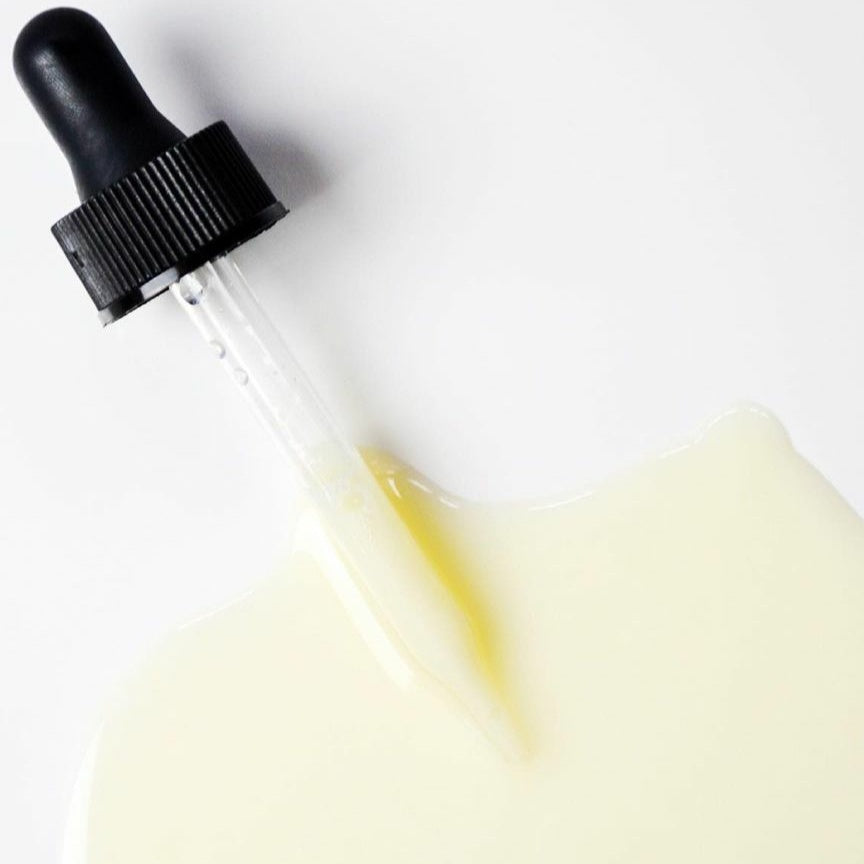If the 90s/2000s were dominated by ‘oil-free’ skincare, the last decade has been a big return of the oils. Coconut oil had its moment, and face oils are now a common skincare step. We’d like to dedicate some time for a deep dive into one of our favorite oils - jojoba. What exactly is jojoba oil? What are the benefits? Should I incorporate it into my skincare routine? And, more commonly, how do I say it? (To answer that right away, it’s pronounced ho-ho-ba.)
Jojoba oil, first of all, is more accurately described as a wax. It’s a liquid, and therefore looks like oil, but its composition of long-chain esters as opposed to triglycerides technically puts it in the wax category. This wax is extracted from the seeds of the Chinensis plant, a desert shrub native to southern California, southern Arizona, and northwestern Mexico (globally speaking, a pretty local plant!). It might seem new in the beauty world, but for centuries, indiginous Americans utilized jojoba to treat wounds and sores. Once extracted, its chemical makeup is similar to our skin’s own sebum, giving it a leg up on all the competition when it comes to absorption.
Why use jojoba?
- It feels great! Like all oils, jojoba is an emollient, meaning that it softens the surface of the skin. And like all other oils, jojoba’s fat-loving composition forms a barrier on the surface of the skin, trapping moisture inside. But while other oils can feel heavy and thick, jojoba is pretty lightweight. To us, it almost ‘melts’ into skin, or feels less oily more quickly. A great option for those who don’t normally like the feeling of oils.
- Non-comedogenic: Non-comedogenicity is a system of rating oils based on their likelihood to clog pores and contribute to breakouts. Jojoba falls on the non-comedogenic side of the scale: less likely to clog. It’s not the most scientific of ratings, but it’s very well-known and pretty widely accepted by many in the skincare world. An interesting topic worthy of its own blog one day!
- May control excess sebum production: Another benefit to jojoba’s sebum-like composition: it may help to regulate the oils we produce. If our face is stripped of too much of its natural oil - from a strong cleanser or toner - it may freak out and make more sebum to compensate. Following up with a similar oil could curb that natural process, slowing sebum production. While this effect is often attributed to all oils, this effect could be stronger with jojoba. Again: not many studies to back this up, but it makes sense to us.
- Anti-inflammatory? Jojoba, among many others oils, is often said to reduce the appearance of redness and inflammation. We can’t find strong science to support this, but it’s a popular anecdotal tip. It may be that gentle, non-irritating oils in general (jojoba included) have emollient properties that just calm the irritation of dry skin. Take this one with a grain of salt.
Whether or not you buy into the jojoba hype, it may just be the right fit for your skin. Its unique texture is a great intro oil for those who don’t normally tolerate heavy products.
And if you’re trying jojoba, make sure it’s the good stuff. We source ours from a family farm in Arizona’s Sonoran Desert. The farm is called Pure Jojoba, and they’ve been cultivating jojoba for over two decades. Their plants are 100% organic - so they’re not adding harsh pesticides to their environment during the growing process. And the whole process happens right there on their farm - growing, pressing, and filtering.
The resulting product is WAY different from what we’ve found from other suppliers - a vibrant golden color and rich aroma that is clearly less processed than others. To us, this means it retains more of its beneficial vitamins and acids, and has less impact on our planet. It also means that Kirk, the farm patriarch and man at the end of the phone line, is always happy to brag about the great batch that I just ordered. We love it when our ingredients come from people who truly know and love their own craft.
Now that you have the background on jojoba, you probably understand why we use it in so many of our products. It’s one of our favorites. Try it in the following:





